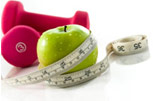Weight Loss Resources
Hundreds of articles about weight loss ...
When using cider in cooking, is all the alcohol burnt off?
Hi, If I use cider in a casserole, or wine for that matter, how do I count the calories? Surely the alcohol is lost in the cooking process so the calories can't be the same as they would have been in a glass!? Appreciate the help.
Our expert says...
Unfortunately not all alcohol is burned off during the cooking process and some will remain in the dish when it is consumed.
The only way to completely remove the alcohol is to 'flambe' it - i.e. light the alcohol such as on a Christmas pudding - this process burns off the alcohol. The normal cooking process will use up some of the alcohol through evaporation but will still retain some. It's difficult to give exact amounts because the evaporation process will differ depending on the type of alcohol and the cooking method and length.
Calories in an alcoholic drink don't just come from the alcohol part of the drink either unfortunately - other ingredients such as sugar will add calories to the drink too and these don't get burned off at all during cooking. Because of this, and not knowing how much of the alcohol itself has burned off, the full number of calories added to the dish are likely to remain present.
To be on the safe side it is therefore best to add the full calorie content from a whatever quantity of wine or cider that you add to your cooking - it's better to overestimate the calories in a meal, than to underestimate and then overeat elsewhere.
Hope that helps!
Disclaimer
You are advised to seek medical advice before making any changes to your diet or lifestyle with an aim of weight loss. This website and the content provided should not be used by persons under 18, by pregnant or nursing women, or individuals with any type of health condition, except under the direct supervision of a qualified medical professional. The information contained in these articles, and elsewhere on this website, is provided for educational and entertainment purposes only, and is not intended to replace, and does not constitute legal, professional, medical or healthcare advice or diagnosis and may not be used for such purposes. Continue...

